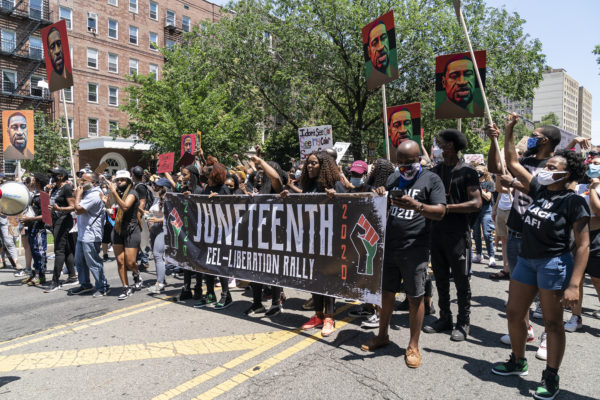Juneteenth, the long-running Black holiday that commemorates the end of slavery in Texas, is now all but assured of becoming a national holiday.
On Wednesday, June 16, the House of Representatives voted 415 to 14 to establish June 19 as Juneteenth National Independence Day. The vote came a day after the Senate passed the bill unanimously, and it will now make its way to President Joe Biden’s desk, where he is considered to be almost certain to sign the measure into law.

Rep. Sheila Jackson Lee, a Texas Democrat who was a lead sponsor of the legislation, stood beside a poster of “Whipped Peter” during Wednesday’s House debate on the bill as she said, “Juneteenth celebrates African-American freedom while encouraging self-development and respect for all cultures. These are the brutal backs upon which the whip went over and over and over again,” referring to the photo of the keloid-covered back of the Black man who had escaped bondage to join Union troops in Louisiana in 1863.
“Making Juneteenth a federal holiday is a major step forward to recognize the wrongs of the past,” Senate Majority Leader Chuck Schumer had said on the Senate floor the previous day. “But we must continue to work to ensure equal justice and fulfill the promise of the Emancipation Proclamation and our Constitution.”
The bill gained momentum thanks to protests led by the Black Lives Matter movement in the wake of George Floyd’s killing by former Indianapolis police officer Derek Chauvin. However, making Juneteenth a national holiday is not all some are looking toward. Many supporters of this bill have also want private companies to recognize it as a paid holiday, as has already been done for state employees by legislation in Texas, New York, Virginia, and Washington. However, politicians such as Wisconsin Republican Sen. Ron Johnson, who dropped his initial objection to the bill, voiced concern about the holiday’s additional federal cost, stating that it would cost U.S. taxpayers hundreds of millions of dollars.
In a statement captured by Yahoo! News, Johnson stated, “Although I strongly support celebrating Emancipation, I object to the cost and lack of debate.” He added, “While it still seems strange that having taxpayers provide federal employees paid time off is now required to celebrate the end of slavery, it is clear that there is no appetite in Congress to further discuss the matter.”
As previously reported, on April 9, 1865, Confederate Gen. Robert E. Lee surrendered the Army of Northern Virginia. The Civil War had ended, and the 1863 Emancipation Proclamation deeming the slaves in Confederate states free became enforceable. However, many slaves in Texas remained in bondage until the arrival of Union soldiers in the town of Galveston on June 19, 1965, and Union Major-General Gordon Granger proclaimed Emancipation Day.
Still, the Emancipation Proclamation only applied to slave states that had joined the Confederacy. As a result, it wasn’t until the 13th Amendment took effect on Dec. 6, 1865, that African-Americans in bondage in states such as Kentucky and Delaware were legally freed.
Rep. Jackson Lee took to Twitter late Wednesday evening to express her feelings about the historic vote.
“Joyful to preside over House passage of Juneteenth holiday bill, which now goes to @POTUS for signing. Thanks to all who worked to make Juneteenth the living symbol of Lincoln’s promise that this nation, under God, would have a new birth of freedom.’ #Juneteenth @HouseDemocrats.”


